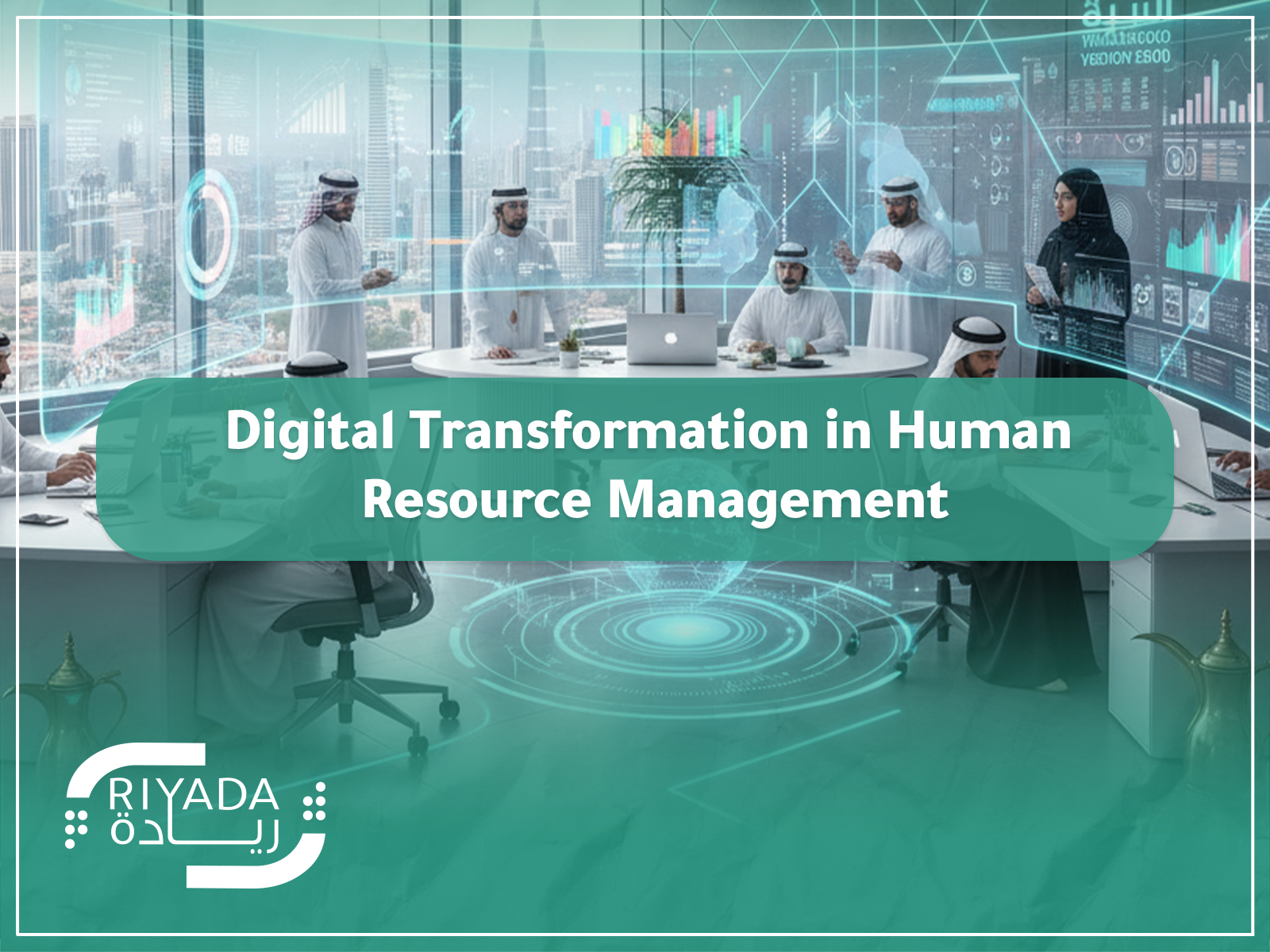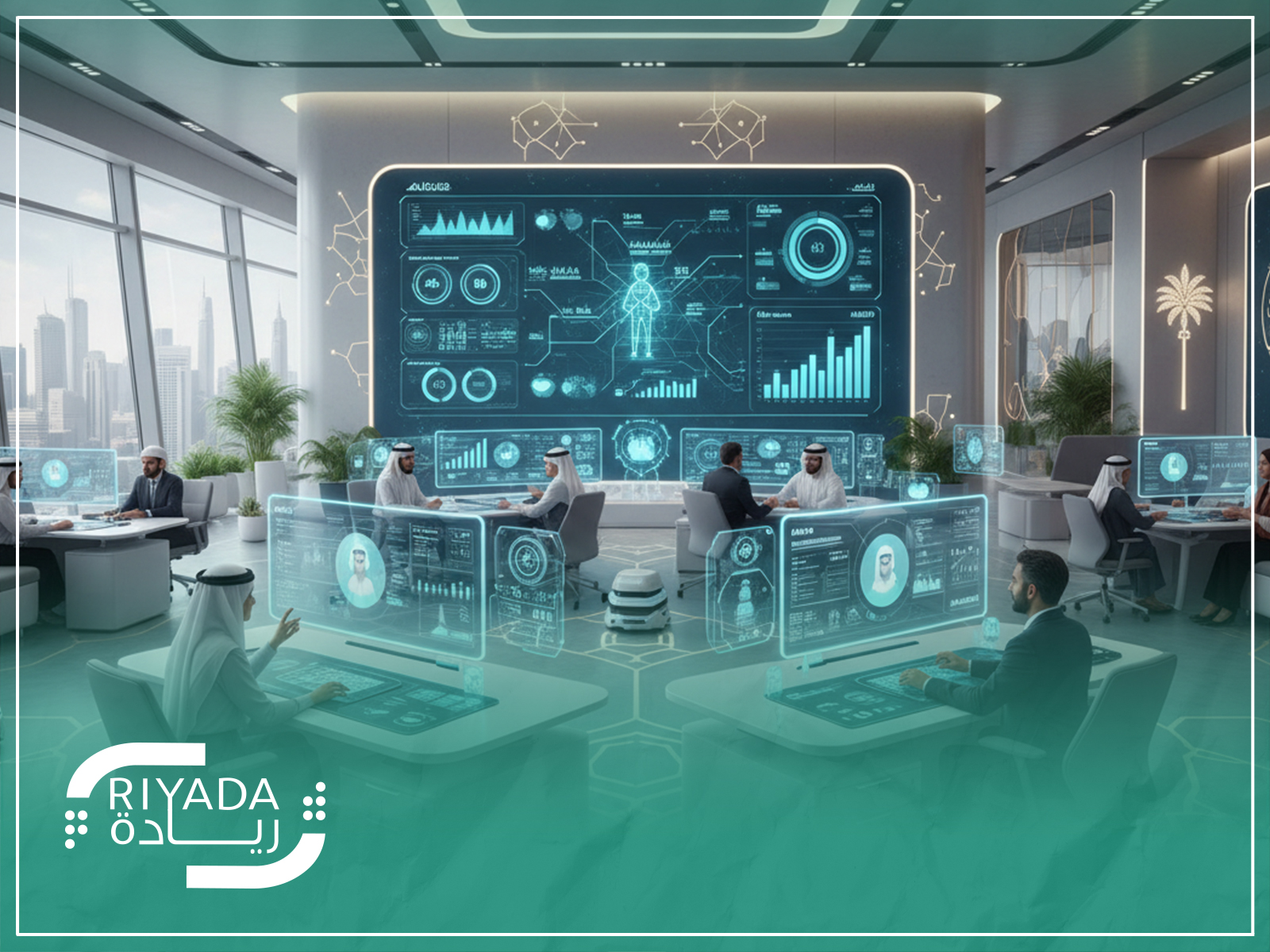
Digital Transformation in Human Resource Management
As businesses evolve, so does the way they manage their most valuable asset—people. The advent of Digital Transformation in Human Resource Management has revolutionized traditional HR processes, bringing new efficiencies, capabilities, and a deeper connection with employees. Companies are embracing this change to not only streamline operations but to ensure a better experience for both HR teams and employees alike.
HR digital transformation is more than just a buzzword; it is a critical step for companies aiming to stay competitive in today’s fast-paced world.
From automating recruitment to using AI for data analysis, digital tools are reshaping how human resources departments operate. This article explores how technology is enhancing employee management and the future of digital HR management.
With expert insights from riyada, we’ll dive into the various aspects of HR process automation, the role of HRMS systems, and the significant benefits of integrating digital HR solutions.
Learn more about: How to Analyze Customer Data to Improve Customer Service?
What is the concept of digital transformation in human resources?

Digital transformation in HR refers to the integration of advanced technology, such as cloud computing, automation, and artificial intelligence (AI), into human resource management systems. This process enhances HR functions, making them more efficient, accurate, and data-driven.
Key components of HR digital transformation:
- Digitization of recruitment processes: Moving from paper-based job applications to automated online systems that streamline candidate sourcing, screening, and interviews.
- HRMS systems: Human Resource Management Systems (HRMS) centralize employee data and HR functions, allowing HR teams to manage employee records, payroll, performance, and benefits from a single digital platform.
- Technology in employee management: The use of digital tools like employee self-service portals and mobile apps to improve employee engagement, productivity, and communication.
By leveraging these technologies, companies can better manage their workforce, optimize HR functions, and create a more agile, responsive HR environment.
How has cloud technologies changed the way employees are managed?
Cloud technologies have significantly transformed the way businesses handle HR functions, making HR management more scalable, secure, and flexible. Here’s how cloud-based solutions are reshaping employee management:
1. Centralized Data Access
Cloud-based HR platforms allow HR teams to access and manage employee data in real-time, no matter where they are. This centralization of information ensures that all HR activities—such as payroll processing, benefits management, and employee training—are seamlessly integrated.
2. Real-time Collaboration
Cloud technologies enable HR teams to collaborate across departments and locations, ensuring consistency in decision-making and enhancing communication. Whether it’s a global company with remote employees or a local team, cloud solutions ensure all relevant HR functions are updated and accessible.
3. Scalability and Flexibility
As businesses grow, cloud-based HR systems scale with them. Companies can add new employees, update benefits, or adjust payroll processing as needed without requiring significant investments in hardware or infrastructure.
These advantages make cloud technologies a vital component of the modern HR management systems that drive successful HR digital transformation.
Continue reading about: Call Center Solutions for Multi-Branch Companies
The role of AI in recruitment and data analysis
Artificial Intelligence (AI) has become a critical tool in the digital transformation of HR, particularly in recruitment and data analysis. By automating key HR functions, AI accelerates processes and improves accuracy.
1. AI in Recruitment
AI tools can automate the initial stages of the recruitment process, such as screening resumes, identifying suitable candidates, and even conducting initial interviews. AI can analyze resumes for keywords, qualifications, and experience, making the process faster and less biased. This is part of the larger digitization of recruitment processes that allows companies to focus on high-value tasks.
2. AI for Data Analysis
AI helps HR teams make data-driven decisions by analyzing large sets of data to identify trends in employee performance, retention rates, and engagement. AI tools can predict future hiring needs, flag potential turnover risks, and recommend strategies for improving employee satisfaction.
By incorporating AI into HR operations, businesses can save time, reduce costs, and improve the quality of their recruitment efforts.
Get the full story on: How Call Centers Accelerate Sales and Follow-Up Processes in Saudi Arabia
What are the benefits of digital transformation in increasing the efficiency of operations?
Digital transformation provides numerous benefits that increase operational efficiency in HR departments. Here’s how:
1. Improved Efficiency
Automation of repetitive HR tasks, such as payroll processing and benefits management, frees up HR professionals to focus on more strategic activities, such as talent development and employee engagement.
2. Real-time Data Access
With HRMS systems and cloud-based platforms, HR teams can access up-to-date information about employees, reducing delays caused by waiting for reports or approvals. This leads to faster decision-making and a more agile HR department.
3. Streamlined Communication
Digital tools improve communication within the HR team and between HR and employees. Self-service portals, instant messaging, and digital feedback systems help employees access information quickly and resolve issues more efficiently.
4. Cost Savings
By eliminating manual processes and reducing paperwork, digital transformation helps businesses cut costs related to HR functions. Companies can also reduce the need for physical storage and labor-intensive administrative tasks.
Discover more about: Customized Call Center Services in Saudi Arabia
How does automation help reduce errors and improve productivity?
One of the main advantages of HR process automation is its ability to reduce human errors and improve overall productivity, Here’s how:
1. Reduced Human Errors
Automation tools reduce the likelihood of mistakes in payroll processing, benefits administration, and data entry. By relying on digital systems rather than manual processes, HR departments can ensure that calculations are accurate and compliance requirements are met.
2. Faster Processing Times
Automated systems speed up routine tasks such as employee onboarding, timekeeping, and performance reviews. This leads to faster processing times and allows HR professionals to focus on higher-value tasks like talent management.
3. Consistency in Operations
Automated systems ensure that HR functions are performed consistently, following the same steps every time, This consistency is especially important for compliance with labor laws and internal policies.
By embracing automation, businesses can streamline their HR processes, reduce errors, and improve overall productivity.
Explore more on: Call Answering Services in Saudi Arabia
The Impact of Digital Transformation on the Employee Experience Within the Company

Digital transformation not only benefits HR teams but also improves the employee experience within the company. Here’s how:
1. Self-Service Platforms
Employees can access and update their personal information, request time off, view pay stubs, and more, all through digital platforms. This reduces the need for HR to manage routine tasks, allowing employees to resolve issues on their own.
2. Real-Time Feedback and Recognition
Digital tools make it easier for managers to provide real-time feedback and recognize employee achievements. This fosters a positive work environment and helps employees feel valued.
3. Better Access to Training and Development
Digital platforms offer employees access to learning resources, career development programs, and training materials. This enables them to grow within the company and stay engaged in their work.
Digital transformation enhances the overall employee experience by providing tools that improve engagement, productivity, and satisfaction.
Find out more about: Call Center Outsourcing in Saudi Arabia
Practical Steps for Digital Transformation in HR
Implementing digital transformation in HR doesn’t have to be overwhelming. Here are some practical steps businesses can take:
1. Invest in Modern HRMS Systems
Choose a comprehensive HRMS system that integrates recruitment, payroll, performance management, and employee data management. This will streamline your HR functions and provide real-time insights into your workforce.
2. Automate Recruitment Processes
Leverage AI and automation to streamline recruitment. Use online platforms that enable easy candidate screening, scheduling, and communication.
3. Promote Employee Engagement through Digital Tools
Implement self-service portals, digital feedback systems, and communication platforms to keep employees engaged and informed.
4. Provide Ongoing Training and Development
Offer employees easy access to online courses, training programs, and career development tools to encourage continuous learning.
By following these steps, companies can successfully navigate their HR digital transformation journey.
read more about: How HR Services Help Improve Business Performance | Cases
Frequently Asked Questions Digital Transformation in Human Resource Management
1. What are the benefits of HR digital transformation?
It improves efficiency, reduces errors, enhances communication, and provides data-driven insights that support better decision-making.
2. How can automation improve HR operations?
Automation reduces repetitive tasks, speeds up processes, and reduces the risk of human errors, leading to more efficient HR management.
3. What role does AI play in HR?
AI helps with recruitment, performance analysis, and data-driven decision-making, improving the overall efficiency and quality of HR processes.
4. What is an HRMS system?
An HRMS system is a software that integrates various HR functions like payroll, recruitment, and employee management into a single digital platform.
Digital Transformation in Human Resource Management is not just about adopting new technology; it’s about enhancing HR operations and employee experiences in a meaningful way, By embracing HR digital transformation, businesses can improve productivity, reduce errors, and create a more engaged workforce.
If you’re looking for guidance on how to integrate digital solutions into your HR practices, riyada offers expert HR solutions to support your company’s transformation journey.
Contact riyada today to explore how we can help streamline your HR processes with innovative digital solutions.


